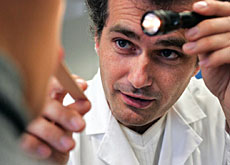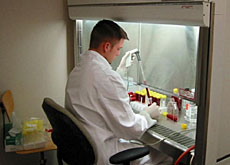Late diagnosis could be helping spread of HIV

A failure by doctors to diagnose new cases of HIV early enough could lead to the virus spreading faster, according to a Zurich University Hospital study.
The survey of 62 patients, conducted between 2002 and 2004 by the university’s department of infectious diseases, found nearly three-quarters had not been diagnosed in the critical early stages.
Project leader Huldrych Günthard told swissinfo that people who acquire HIV are more likely to spread the infection in the first 90-day “acute” stage before the body’s immune system has had a chance to control the virus.
“We found that 72.5 per cent of acute HIV cases had not been recognised during the first contact with their doctors,” he said.
“Research has shown that 30 per cent of fresh infections originate from acute infections. Acute cases infect more easily because they have lots more of the virus in their blood and semen.
“It is therefore critical that fresh infections of HIV are diagnosed early so that we can inhibit the spread of HIV/Aids.”
Confusing symptoms
Günthard said he was not surprised at his findings as they supported evidence from other studies around the globe, adding that the results of his survey could be applied throughout Switzerland.
“Why should the situation in Bern or other parts of Switzerland be any different from Zurich?” he said. “I would say this is pretty much how it is in the whole country.”
But he refused to blame doctors for the low rate of early diagnosis, pointing out that early symptoms of fever, diarrhoea and mouth ulcers could also be the result of other more common complaints.
“I am not saying that doctors are no good, because I recognise that HIV can be difficult to diagnose. But I want to make doctors think about asking their patients if they think HIV could play a role.
“If a patient has a viral syndrome then the doctor has to ask if HIV has a role. If there is a flu epidemic then it is probably the flu, but if someone has just got back from vacation, then it is good medical practice to ask.
“Some patients do not tell their doctors up front if they have done something that has put them at risk of contracting HIV, but will say if they are asked.”
The Swiss Association of General Practitioners did not dispute Günthard’s findings, saying the low rate of early diagnosis was “possible”.
But association president Hansueli Späth told swissinfo that carrying out HIV tests is not always straightforward.
“For this rate [of non-detection] to fall there has to be an HIV test with every visit to the doctor whatever the reason for the consultation,” he said.
“Diagnosis with an HIV test is easy. The problem is whether to carry out the tests if that is not the primary reason for the consultation. Is it in the patient’s interest? Who pays, who has the time? Has the patient consented?”
Need for dialogue
The Swiss Aids Federation has called for better communication between patients and doctors.
“We recommend to patients that they try to think of the possibility of HIV and we ask family doctors to talk to patients about this,” said Thomas Lyssy, the prevention group’s spokesman. “It is important to establish a dialogue between patient and doctor.
“HIV/Aids affects everyone whether they are rich or poor, young or old. Imagine a family doctor seeing a 72-year-old patient with flu and the treatment doesn’t work. Would the doctor think about HIV?”
The number of reported new HIV cases in Switzerland dropped to 343 in the first six months of this year compared with 369 in the same period in 2004, according to figures from the Federal Health Office.
The health office has also launched a study that will run until June 30, 2006, to find out when and how people become infected with the virus in an effort to improve prevention in Switzerland.
swissinfo, Matthew Allen in Zurich
Since 1985 there have been 27,904 HIV-positive test results in Switzerland.
Last year there were 741 new cases of HIV and 300 new cases of Aids reported.
The number of deaths from Aids decreased from 22 in the first six months of 2004 to 17 in the corresponding period this year.

In compliance with the JTI standards
More: SWI swissinfo.ch certified by the Journalism Trust Initiative











You can find an overview of ongoing debates with our journalists here . Please join us!
If you want to start a conversation about a topic raised in this article or want to report factual errors, email us at english@swissinfo.ch.